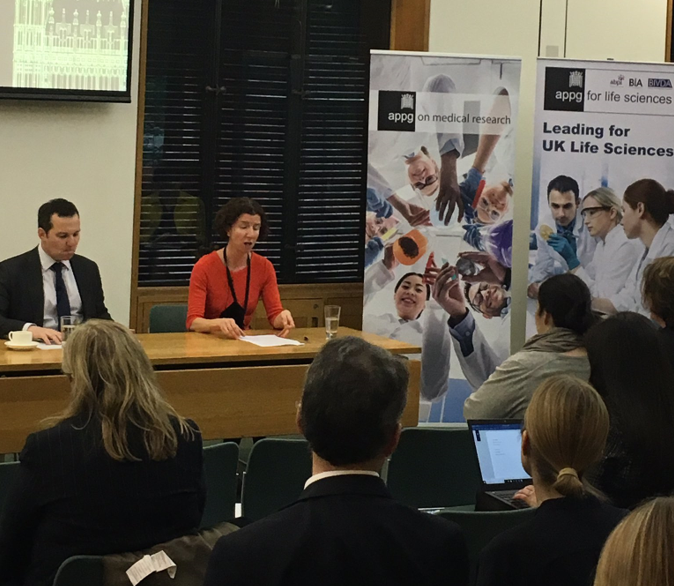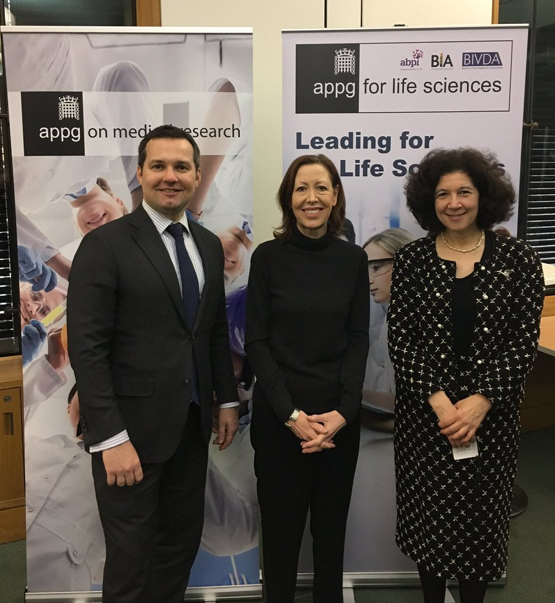Preparing for the Spending Review | Part 2: Bringing key messages to Parliament
In this second edition in our blog series on the 2019 Spending Review, Eric reports from a recent event in Parliament jointly organised by the All-Party Parliamentary Group (APPG) for Life Sciences and the APPG on Medical Research. Missed the first blog? It’s available here.
A key part of the BIA’s work on the Spending Review (SR) is engaging parliamentarians, who have a role in scrutinising and approving the Government’s decisions. To start this process, two weeks ago we teamed up with partner organisations across the life sciences sector to organise an event in the House of Commons – “Keeping the UK a world leader in medical research: the need for cross-government coordination”.
The event was jointly organised by the All-Party Parliamentary Group (APPG) for Life Sciences and APPG on Medical Research. These groups are formed of MPs and Peers from both sides of the aisles with the aim to highlight the value of the life sciences sector and its vital research. The BIA is providing the secretariat for the APPG for Life Sciences together with ABPI and BIVDA, while the APPG on Medical Research is supported by the AMRC and charities, including the Wellcome Trust and Cancer Research UK.
The event brought together MPs and Peers, key civil servants from government departments, stakeholders from both industry and charities, and representatives from funders, such as UKRI, Innovate UK and the Medical Research Council.
As Chair of the APPG on Medical Research and Vice-chair of the APPG for Life Sciences, Chris Green MP (Con, Bolton West) chaired the panel. First, we heard from Anneliese Dodds MP (Lab, Oxford East), who is a Labour Shadow Treasury Minister, ex-Member of the European Parliament and a strong supporter of the life sciences sector.
In her speech, Anneliese highlighted that the uncertainty of Brexit for R&D – and indeed the whole economy – puts the SR is a challenging context. She welcomed the Government’s additional £7bn investment in R&D by 2021 but argued that a longer funding commitment is needed. She said that this commitment should be focused on the needs of the life sciences sector to help drive a higher proportion of highly skilled jobs.

Chris Green MP and Anneliese Dodds at the event.
Anneliese noted that despite political uncertainties, the sector is continuing R&D investment and attracting record venture capital from investors . While the second Life Sciences Sector Deal is welcome and builds on the success of the first Sector Deal, she reiterated that the sector needs a long-term mission which the SR can help with.
Next, we heard from Barbara Domayne-Hayman, Entrepreneur in Residence at the Francis Crick Institute and Chair of the LifeArc Seed Fund Investment Committee. Barbara has over 30 years’ experience in the life sciences industry, with the first 11 years on the commercial side of a large company, after which she transitioned to the entrepreneurial world of biotech.
She spoke about how public funding supports the whole life sciences ecosystem, from universities and charities to SMEs and global companies. In particular, she highlighted how funding programmes, such as the Biomedical Catalyst, help SMEs to scale-up and crowd-in private investment further down the line.
We also heard from Jane Taylor, who chairs the Patient Insight Partner Group of Versus Arthritis. Jane also chairs a patient insight group for a European research project on osteoarthritis and spoke about the value of international collaborations for biomedical research. She emphasised that for this research to be developed into innovative treatments that can help patients, it needs strong government support through the SR.

Chris Green MP, Jane Taylor and Barbara Domayne-Hayman.
Following the opening speeches, we had an interesting Q&A session in which the audience asked questions and commented on a wide range of topics, including on skills, immigration, government levers, and the balance between government-funded grants and interventions to leverage private investment.
Thank you again to all the speakers and attendees – I hope you found the discussions both enjoyable and useful.
In my next blog in the series, I’ll break down a recent BIA panel session at our Committee Summit, where we heard from a stellar panel – including senior representatives from the Treasury and UKRI – on key considerations for the SR and implications for the sector. Stay tuned!
.png)
.png)
